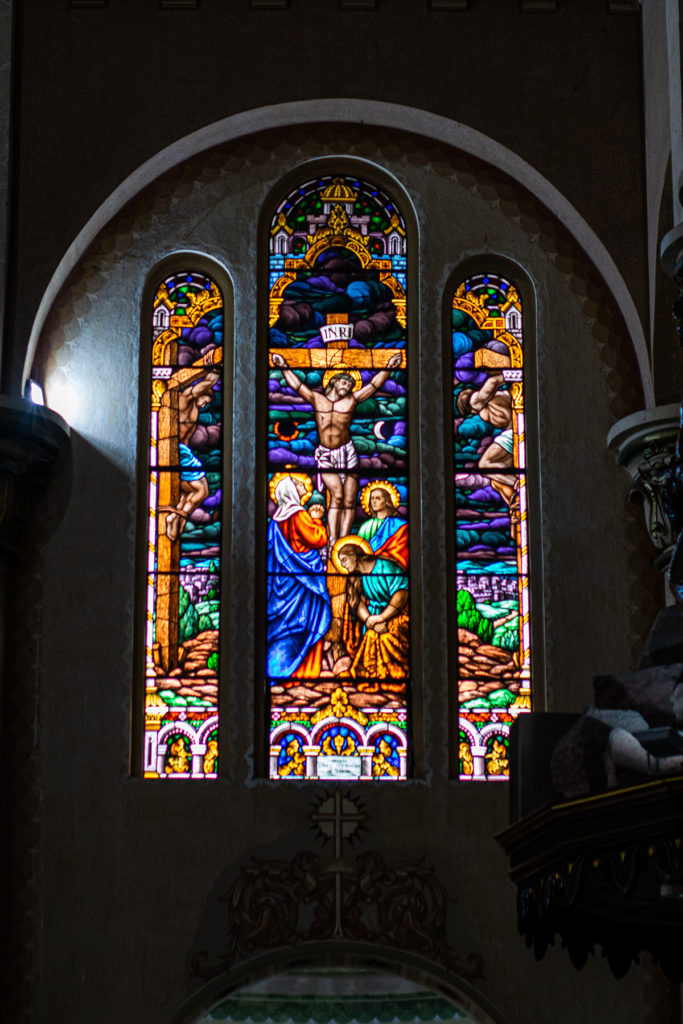February 27, 2022
The Rev. Canon Marianne Wells Borg
Luke 9:28-36 (21-27)
This is the Sunday before we begin the season of Lent. The Gospel story today is about the transfiguration of Jesus on a mountain top. At the end of Lent we are told of another mountain top transfiguration of Jesus. His resurrection. So Lent is framed by two stories about Jesus appearing in “Glory.” But what is Glory? The glory of Jesus? The glory of God? It’s interesting that the Greek word for glory, doxa, means an opinion. An opinion. We assume glory is the “highest” opinion. What if it is the unexpected?
Our gospel begins “Now about eight days after these sayings….” Eight days being a symbolic number indicating that now is the time to see things anew. So, the sayings that preceded todays’ Gospel are intended to influence our suppositions or the suppositions of the disciples in the story.
So, here they are. Luke writes: “The Son of Man, (“son of man” incidentally means a person, a human being, it is not an elevated title), the Son of Man must undergo great suffering, and be rejected by the elders, chief priests, and scribes, and be killed…”
“If any want to become my followers, let them deny themselves and take up their cross daily and follow me. For those who want to save their life will lose it, and those who lose their life for my sake will save it. What does it profit them if they gain the whole world, but lose or forfeit themselves?”
So, that’s what preceded today’s reading.
And these are difficult sayings. Deny yourselves, take up your cross daily… lose your life to save it… so what if you gain the world if you lose your soul. And Jesus was also talking about his suffering and death.
So Peter and James and John and Jesus go up a mountain. And while Jesus was praying they “saw his glory.” His face radiant, his clothes dazzling and bright. And Moses and Elijah were with him Two other great holy men. Peter’s first response was say let us make three dwellings, three monuments, to honor them. But as Luke notes, he did not know what he was saying.
So, after Peter says let us make three dwellings, a cloud immediately overshadowed them. Erasing their picture of how to honor Jesus. It made immaterial their towering tributes. And the cloud was terrifying. And powerful. A very different kind of power than the glory that dazzled them. And it made them tremble. It disoriented them.
And then the disciples hear a voice. A still small voice. Like the kind Elijah heard. Or as another translation puts it they heard the sound of thinnest silence. The sound of thinnest silence.
“This is my Son. Listen to him.”
Listen to him.
The voice was an interruption. The kind of interruption that occasionally breaks into our lives, stops us in our tracks. Arrests our thoughts. Don’t build monuments to honor Jesus. Listen to him. And follow him.
Listen to Jesus. Remember what he said. Remember how he described God and God with us. God with us. Remember how your hearts burned with passion when he said proclaim release to the captives, recovery of sight to the blind, let the oppressed go free. Do not forget the poor, the hungry, those who weep. Face their difficulty as if it were your own. For it is. Do this in remembrance of me. And he told them to love their enemies and do good to those who hate you. And forgive them. Give to anyone who begs from you. Do to others as you would have them do to you. Expect nothing in return.
And remember how he looked at you. How you felt in his presence. Like somehow you were being transformed little by little. Even becoming like him. Which felt more like yourself than yourself.
Listen to him.
How do you authenticate such a call. From thinnest silence. The only way is by your response. It is the response to such a call that makes the call real. It is our response to such a call that makes real the history of God. We are the ones who make existent God’s insistence.
The disciples kept silence. Pondering these things in their hearts.
So, I suggest that the transfiguration story intends to prefigure the mountain top experience of Calvary.
Like Peter James and John we tend to picture the resurrection like the glorious transfiguration. Dazzling and radiant. A display of triumph and power. A kind of glory that the world knows and recognizes. And loves. Jesus in triumphant glory. As God would have it. And then the cross becomes a thing of the past.
But as I enter the season of Lent this year, I puzzle anew about the story of the cross and its glory. Jesus death was difficult. The reality of the cross is difficult. And the glory of the cross, if we are to call it glory, is at best a difficult glory.
As you know, the cross was a form of execution for insurrectionists. For those who were a threat to the social order of the world. Jesus was such a threat. Death on a cross was a public, slow, torturous, painful death. And to see crucifixion was intended to be a deterrent. Jesus was killed because of what he proclaimed and taught and embodied in the name of God. He turned our assumptions about the way the world can be upside down. His vision was destabilizing.
We know this. The followers of Jesus knew this. But it is almost as if we have minimized the challenge of his vision and the difficult, horrific death on the cross when we constructed a story 1000 years ago that claimed that Jesus’ suffering and death was a divine economic strategy. His death served as ransom, a blood and indeed human sacrifice, to pay for our sins. Required and devised by an angry and demanding God? That argument took hold. And has continued to influence Christian believers over the last 1000 years.
But this way of telling the story turns Jesus’ execution into a divine plan that is highly conditional and transactional. As if God were transactional. And yes, pre-planned.
Those who still hold to this story may consider it a stake in the ground for our belief. But I say it negates what really happened. It treats too lightly how difficult and devastating the loss of Jesus was to his followers. It makes the heinous death of crucifixion the stage for divine intervention. And ironically subverts the power of the resurrection. With this story, the resurrection was planned from the beginning.
I say the resurrection was unexpected. I say the resurrection was the impossible. The coming of something people did not know was coming, did not think could happened. That from a situation so horrible could come life after all. And this terrified the authorities as much if not more than Jesus did. They were able to kill Jesus. But they could not kill the life that was in him and lived in his followers. Jerusalem, we have a problem.
Traditionally Glory and Kingship and Sovereignty have described the triumph of Easter. The coming and I quote, of the “One True King, who will proclaim the One True Church which will hold one worldly power and sovereignty and glorify the one which is over the many.” Jesus being the King of Glory who will reign forever and ever.
But if that is the image we hold today, Jesus as the one true king over the one true church, and one worldly power, if that be our vision of the future of Christianity, let a cloud come over us! Let a cloud overshadow us. Let a cloud obliterate such a thought. And may we tremble.
Because what I have described is not the vision of the glory of Jesus. What I just quoted is the vision of the Emperor Constantine. It was Constantine’s vision for the Roman Empire: One True King, the One True Church, One world; one worldly dazzling sovereign power over the many. The marriage of Empire with The Church Triumphant, politics and piety in one accord, undefeatable. This was to be the glory of the Holy Roman Empire. But such a marriage I suggest is an unholy alliance. A dangerous and unholy alliance. This is the glory of Emperor Constantine. Such “glory” is not the glory of Jesus. What is describes is not the reign of the kingdom of God. It is the reign of the kingdom of Caesar.
The glory of Jesus is not the glory of a triumphant King. It is the glory of a love supreme. But it is a difficult glory. A wounded glory. The glory of a divine life executed.
Jesus was executed for proclaiming the kingdom of God but by the fourth century became the overlord of the kingdom of Caesar. It has been argued that if Christianity hadn’t become a pawn of the state it may not have survived to this day.
I suggest we look at the cross and let it reorder our assumptions about the glory of God and glory of Jesus. The cross exposes the difficulty of our life and the human condition. It exposes our vulnerability and mortality. It exposes our suffering and powerlessness and the inevitability of death.
And we are to be aware daily of the difficulties of life. As Jesus was. We are to daily take up “the cross,” those things that expose the difficulties that beset the human condition, and daily passionately address them. As Jesus did. Risk supreme love. Love that does not expect return. That is supreme love. Unconditional love. Not transactional love. Which is not the love of God at all. Those things that expose difficulty, in those things we hear our call.
But the difficulty of our human life is not the only word nor the last word about us. What arises from the difficulty, from the struggle, from the tragic is remarkable. Worthy of the name glory. Ours is a wounded glory; our resilience, our courage, our love for what is to come, our confidence that the future can be better, that more is possible, our desire beyond desire for hope is our glory. For all its difficulty life is gift. Not asked for. Given. And that we are here at all is remarkable. And for all its difficulties life calls forth greater life from us.
I suggest that the truest power of our humanity arises not from our strength but from our difficulties. Not from sovereign power, which we do not possess, but from our weakness. I am not making rational sense. I am being stirred by something else. I am puzzling. Wondering about glory amidst our difficulties. My thoughts are being reordered. Some may think disordered.
So, after eight days or 2000 years, how are we to understand and tell the Jesus story? It is a difficult story about the limits and difficulties of the divine and human condition. That is almost the opposite of how we tell it. Have we mistaken glory as from on high whereas it truly comes from below? From us.
We are the ones who embody glory. Perhaps that eye has not seen nor ear heard. But we have experienced its transformative effects. In ourselves, from one degree to another. And we see transformation in our world. Even though the days are dark and the difficulties deep and seem insurmountable. Perhaps it is the light of wounded glory that shines in our darkness. God suffers with us. In us. God shares in our weakness. God shares in our mortality. This reorders everything. Confounds it.
Is this the foolishness of God Paul talks about? The weakness of God that causes the emperor to tremble?
Something arises in the midst of difficulty, something arises from the weakness and vulnerability of our human condition, something arises unexpectedly, as we reach out for holiness.
[note to readers: I am deeply indebted to the work of John D Caputo and in particular his book Cross and Cosmos which has brought my thinking and understanding to this new light and with it the courage to share it with you.]




Thanks, Marianne.
I have, for a long time, shared this understanding of the crucifixion and rejected what I was taught when I came to faith. However, most of my church friends still hold to the penal substitution idea as do the words of so many hymns. I really struggle with this – how can I help my church friends to look differently? When I share with them my position, I gain the impression that they feel I ‘have lost my way’ or worse, become a heretic!
Marianne, thank you for this wonderful sermon!
I was involved in a congregational renewal effort in the 1970’s in which we told this version of the crucifixion, by Rome. for treason. Let me point to a specific difficulty in using a metaphor, like “lord” to speak of Jesus. The danger is that rather than the life and character of Jesus transforming our idea of what a true lord is, the secular image of imperial autocratic lord may transform our idea of what Jesus was about. so it has happened. thank you for raising this point of view again.
I was involved in a congregational renewal effort in the 1970’s in which we told this version of the crucifixion, by Rome. for treason. Let me point to a specific difficulty in using a metaphor, like “lord” to speak of Jesus. The danger is that rather than the life and character of Jesus transforming our idea of what a true lord is, the secular image of imperial autocrat may transform our idea of what Jesus was about. so it has happened. thank you for raising this point of view again.
Dear Rev. Marianne:
Thank you, thank you, for your words and for your willingness to be brave in speaking them. Glory and the Cross, what a whole new way of hearing and seeing and reordering! I was reminded of the John Legend/Common song of Glory (from the movie Selma) which seems to embody some of what you are expressing. I seem to have given up over these past few years of all that I have been taught and the language used to share the Gospel of Christ. Thank God for folks like you and Jack Caputo and many others who are speaking words of wisdom in a new way and understanding of “supreme love.”
Marianne,
Thank you for incorporating the insights of Jack Caputo on crucifixion and resurrection into your preaching. I find Second Saturday Conversations, the small group sharing and the books of John Caputo open up an fresh and challenging perspective on the story of Jesus. Religion cannot contain the mystery of the Unconditional that is lived so fully in the life of Jesus. “How filed with awe is this place.”